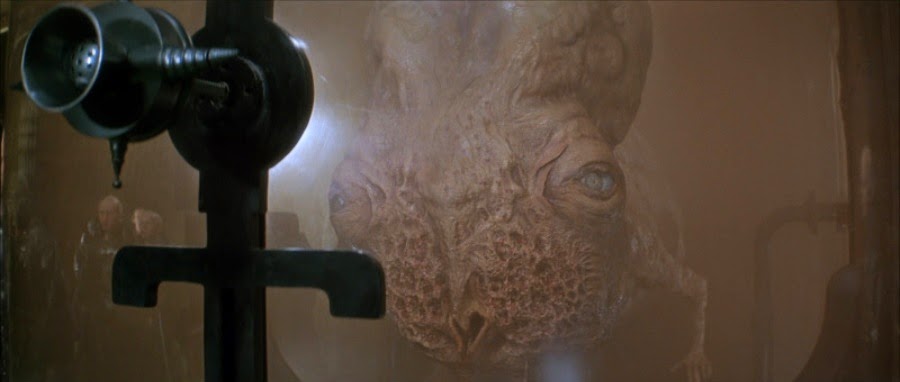It could be seen as a measure of my own perversity, as it contradicts the opinion not only of the filmmaker but the opinions of numerous film enthusiasts whose discernment in these matters usually matters to me, but I consider DUNE very much the finest film of its kind and one of Lynch’s finest efforts as well. It was thirty years ago that the film was first released in a form that the filmmaker nominally approved, and he had already begun adapting one of Herbert’s subsequent tomes for its sequel (I believe it’s called Dune Messiah,) when the critics lambasted it as incoherent, the book’s admirers collectively frothed at the mouth and David Lynch ended up suffering what his daughter has described as a year long depression.
I’ve chosen these frames from fairly early in the film, when
Paul’s future wife, Irulan, introduces us to the plot and his
grandmother, Gaius Helen Mohiam, acts as seer for the girl’s father,
Padisha Emperor Shadam IV, in his confrontation with one of the Spacing Guild Navigators, and the old lady consequently tests her boy with the Box.
It is in moments such as this when one realizes that one is in the hands of a master story teller.
The Baron explains the Plan
I believe that it was this scene which caused fellow Howard Hawks idolator, Robin Wood, to dismiss Lynch’s masterpiece, in a footnote, as the most obscenely homophobic movie
in the history of the medium. I believe Mr Wood, as a kind of
Gay guy, found it difficult to identify with any of the men in this
scene other than the Baron Vladimir Harkonnen. It seems not to have crossed his mind that Ernesto Laguardia’s unnamed victim might also be
read as Queer or Gay, or that the scene itself might have something interesting
to say about Power in a Society, such as ours, that worships Petroleum
and the Act of Consumption. Consider the anonymous attendant, directly below, apparently blinded and deafened in order to protect royal secrets. (I unfortunately identify with him.) Isn't he Queer as well? He is very useful, even necessary in his way, to those in control.































































